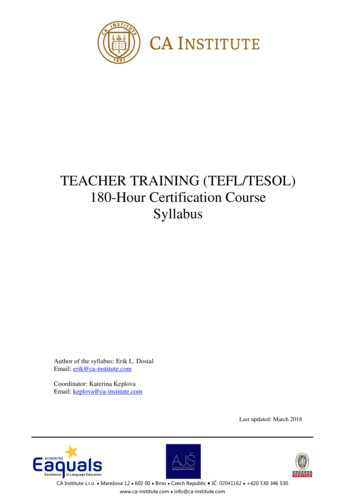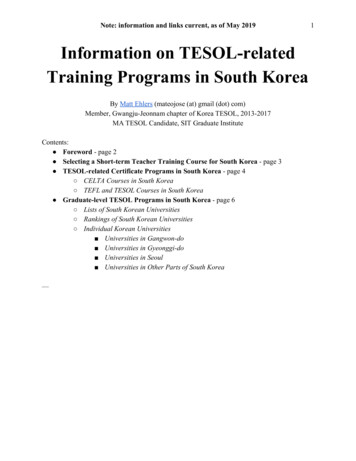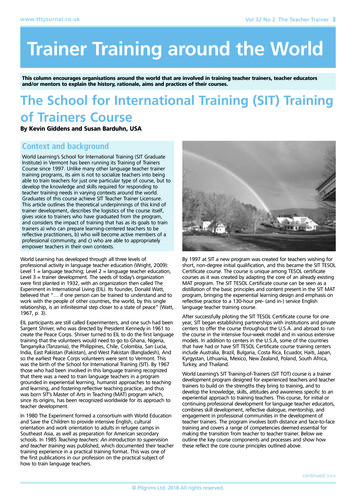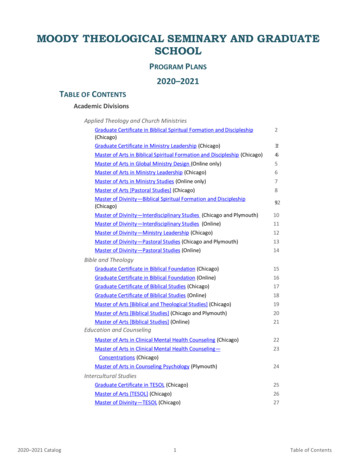
Transcription
TEACHER TRAINING (TEFL/TESOL)180-Hour Certification CourseSyllabusAuthor of the syllabus: Erik L. DostalEmail: erik@ca-institute.comCoordinator: Katerina KeplovaEmail: keplova@ca-institute.comLast updated: March 2018CA Institute s.r.o. Marešova 12 602 00 Brno Czech Republic IČ: 02041162 420 530 346 530www.ca-institute.com info@ca-institute.com
Teacher Training (TEFL/TESOL) 180Hour Certification CourseTeaching English as a Foreign LanguageTeacher Training Certification CourseSyllabusCourse duration:Intensive 4-6 weeksOR1 semester – 17 weeks180 Total Hours(150 hours – coursework, inc.self-study30 hours – practicum)CA InstituteE-Mail: info@ca-institute.comOverviewCA Institute Teacher Training (TEFL/TESOL) 180-hourcertification courses are designed for individuals with auniversity degree who are seeking to teach English as a foreignlanguage.GoalsThe course includes modules that prepare you to teach evenunder the most basic conditions from young learners to adultsand all levels. This includes course methodologies andapproaches, curriculum development, class lesson planning andteacher development.Theme 1: Language Learning Environments and Contexts The Field of TESOL/ELT The EPG (The European Profiling Grid) Teaching Methodologies The Psychological Learning Environment L1, L2, L3 and more New Ideas in Education R-PPP-R and Lesson Planning Student Levels CEFR (Common European Framework ofReference for Languages)Theme 2: Planning and Resources In the Classroom Classroom strategies Boardwork Using Visuals and Technology Games in the Classroom The Formal Lesson Plan Using supplementary resources Writing a CV and cover letterTheme 3: The Language Items and Language Skills How to teach Grammar How to Teach Vocabulary How to Teach Listening and Reading How to Teach Writing, Speaking and PronunciationTheme 4: Language Awareness and Proficiency Metalanguage History of EnglishMaterialsThe Language Teacher’sGolden Companion:A Modern Approach toTeaching English as aForeign Language,inc. Activities, Tasks andQuizzesTEFL/TESOL Notebook:A Companion Supplement for30 Hours of PracticumOther resourcesFilm, documentaries, TV,projector, internet,dictionaries, special projectsMilestonesModule quizzesGraded assignmentsMid-course ExamCourse ProjectSample lessonFinal ExamCertificate upon completion.
Grammar ReviewTheme 5: Assessment Assessment designTheme 5: Professional Development Developing as a Language TeacherPrerequisites At least B2 level of English based on CEFRRequirementsIt is necessary to be flexible and prepared. Please complete allassignments beforehand and bring the following to class:1. Laptop2. Articles, textbooks, documents and homework
Topic Outline / ScheduleImportant Note: Refer to the course calendar for specific meeting dates and times. Activity and assignment details will be explained in detail within each week'scorresponding learning module. If you have any questions, please contact your instructor.Theme 1: Language Learning Environment and ContextsLessonNumber1.11.2Syllabus ContentIntroduction to course. Courserequirements and expectationsModule 1:The Field of TESOL/ELTModule 1:Learning styles Teacher's rolein development The EPG1.3Module 2:Teaching Methodologies1.4Module 3:RPPPRLanguage ItemsLanguage SkillsLesson PlansModule 4:In the ClassroomCEFR1.5Learning OutcomesAssignments and Assessment1. Have students gain a better insight into the course, its requirements andexpectations2. Answer and settle any logistic issues3. Get to know your instructors, mentors, and colearners4. Learn the TESOL/ELT terminology1.Understand the various learning, input, and reasoning styles students mayhave2. Discuss the different motivation and expectations of various students3. How to develop and maintain motivation4. Become aware of the different roles teachers may adopt5. Find out where you score on the EPG and plan out how you can improvethat by the end of the course1. Learn a brief history of language teaching from the past through the1970’s and beyond2. Discuss the various merits of the “designer” approaches, communicativelanguage teaching and other post-method approaches3. Understand how the psychological learning environment effects lessons4. Demonstrate an awareness of CLIL, L1, L2, L3, Translation, and othernew ideas in education.1. Understand what learning a language involves2. Know the language items and language skills3. Become familiar with all aspects of the RPPPR4. Learn how to write a lesson planReading: M1Assignments: M1A1, M1A2Practicum: Mentor Teacher Observation1. Understand the CEFR and what each level entails2. Become familiar with the physical classroom and the strategies to use inthe classroomQuizzes: M4Q1, M4Q2Writing a CV and cover letter, applying for jobsHW: Write CVQuizzes: (Closed book) M1Q1, M1Q2Reading: M2Assignments: M2A1, M2A2Practicum: Mentor Teacher ObservationQuizzes (Closed book) M2Q1, M2Q2Reading M3Assignments M3A1, M3A2Practicum: Mentor Teacher ObservationQuizzes: M3Q1, M3Q2Reading: M4Assignments: M4A1, M4A2Practicum: Mentor Teacher Observation
Classroom StrategiesSTT/TTT3. Presenting board work4. Discuss STT/TTT and how students can maximize efficiencyModule 5:Formal Lesson Planning1. Understand the principles of effective lesson planning2. Devise lesson plans that include Aims/Can do statements Class description Difficulties and solutions List of resources Interaction types Description of procedures and timing3. Evaluate the progress their lesson plans have taken through the course1. Become familiar with various resource materials Visuals EFL Textbooks Supplemental materials Online resources and technology Games2. Evaluate these resources and how they can be effective tools in theclassroomModule 6:Teaching ResourcesReading: M5Assignments: M5A1, M5A2Practicum: Mentor Teacher ObservationReading: M11Practicum: Peer Observation/TeachingQuiz: M9Q1Reading: M9.Assignment: M9A1.Practicum: Peer Observation/Teaching
Theme 2: The Language Items and Language SkillsLessonNumber2.1Syllabus ContentModule 7Productive Skills: Writing2.2Module 7:Productive Skills: Speakingand Pronunciation2.3Module 8Receptive Skills: Listening2.4Module 8:Receptive Skills: ReadingLearning Outcomes1. Understand basic concepts used for writing and its use in teaching andplanning2. Identify writing sub-skills and features of written texts and make practicaluse of it in teaching3. Understand literacy issues4. Correctly use and explain punctuation and spelling5. Learn how to provide written feedback1. Demonstrate a knowledge of English phonology (phonemic charts)2. Understand features of speech Minimal pairs Linking Intonation Stress3. Discuss methods of practically teaching pronunciation in the classroom4. Discuss differences between spoken and written English5. Apply knowledge of a wide range of language functions and their formsto practical teaching contexts1. Understand basic concepts used for listening skills and using this inteaching2. Understand purposes and approaches to listening texts3. Identify difficulties learners face while listening4. Demonstrate methods of aiding learners comprehend listening texts andimprove their skills1. Understand core terminology used for reading skills and apply this toplanning and teaching2. Understand and make practical use of various purposes and approaches ofreading texts3. Text-based approach4.Practical use in teaching of reading sub-skills Meaning from context Words vs. sentences vs. whole textAssignments and AssessmentTeaching Writing Lesson Plan Based on NeedsAnalysis. Quiz: M8Q1Reading: M8Assignments: M8A1, M8A2, M8A3Practicum: Peer Observation/TeachingTeaching Pronunciation Lesson PlanQuiz: M8Q2.Reading: M9.Assignments: M8A4, M8A5Practicum: Peer Observation/TeachingListening Lesson Plan.Quiz: M7Q1Assignment: M7A2.Practicum: Peer Observation/TeachingReading Lesson PlanQuiz: M7Q2Reading: M8.Assignment: M7A3.Practicum: Peer Observation/Teaching
2.5Module 9Vocabulary2.6Module 9:VocabularyVocabulary PPP ProcedureTeaching MeaningVocabulary SpeakingActivities Vocabulary ReviewActivities2.7Module 10:Teaching Grammar using aFunctional ApproachTypes of Grammar PracticeExplaining Grammar5. Identify difficulties learners face while reading6. Demonstrate methods of aiding learners comprehend reading texts andimprove their skills1. Understand the principles of word formation and meaning Definition Pronunciation Spelling Conative vs. denotative meaning2. Review the English Vocabulary Profile (EVP)3. Identify lexical and spelling differences between British and AmericanEnglish1. Learn various methods of teaching meaning2. Understand how to use drills (forms-oral, recall) in a lesson3. Effectively apply the RPPPR procedure to vocabulary4. Set up and manage speaking activities and vocabulary review activities1. Demonstrate a clear grasp on all previous topics2. Learn to present grammar functionally3. Review types of grammar practice4. Discuss various methods of explaining grammar to different student levelsQuiz: M6Q1.Reading: M7Assignment: M6A1, M6A2Practicum: Peer Observation/TeachingTeaching Vocabulary Lesson Plan.Quiz: M6Q2Assignment: M7A1Practicum: Peer Observation/TeachingTeaching Grammar Lesson Plan – SampleLesson Reading: M6.Practicum: Peer Observation/Teaching
Theme 3: Language Awareness and ProficiencyLessonNumber3.13.2Syllabus ContentModule 10Meta-languageHistory of EnglishEnglish GrammarModule 10:English GrammarLearning Outcomes1. Understand key meta-language and how to apply these terms in teaching2. Become familiar with a brief history of the English language3. Understand the rules and conventions of word order and the parts ofspeech4. Be able to explain the various types of verbs5. Discuss and demonstrate a working knowledge of general grammarstructures and tenses6. Review the English Grammar Profile (EGP)1. Be able to present and explain the following grammar topics: Verb patterns Reported speech Conditionals Passive voice2. Show an awareness of the grammatical differences between British andAmerican EnglishAssignments and AssessmentTake the General English Placement Exam forEFL Students.Students prepare to teach grammar topic in nextlesson. Discuss Final Project and FinalPresentationsAssignments: M5A3, M5A4Practicum: Mentor Teacher ObservationReview All Grammar.Prepare for Midterm examPracticum: Peer Observation/Teaching
Theme 4: Planning, Assessment, and ResourcesLessonNumber4.2Syllabus ContentModule 11:AssessmentLearning Outcomes1. Understand basic concepts of assessment2. Identify the various methods of assessment and how to use thempractically in teaching contexts3. Know and distinguish the differences between several internationalstandardized testsAssignments and AssessmentQuiz: M9Q2Reading: M10.Assignment: M9A2, M9A3.Practicum: Peer Observation/TeachingTheme 5: Professional DevelopmentLessonNumber5.15.2Syllabus ContentModule 12:Developing as a Teacher.The EPG.TD-FRAMReview of Tense Forms andGrammarMetalanguageSubmit Final ProjectsFinal PresentationsEnd of Course ReflectionsLearning Outcomes1. Make an honest self-appraisal of own teaching2. Assess own strengths and development needs3. Set goals for future development1. Give constructive feedback of colleagues’ presentations 2.Respond to feedback from instructors and peersAssignments and AssessmentAssignment: The EPG and TD-FRAMPracticum: Peer Observation/Teaching
Assessment criteria and grade descriptorsLesson PlanningTeaching andClassroomManagementLearner AwarenessSelf Awareness andDevelopmentOverallGrade of AGrade of BGrade of PassCandidates can effectively plan with little to noguidance. Plans are comprehensivelyconstructed with appropriate resources andcreative tasks selected for successful languagedevelopment.Candidates give effective language lessons.They use a variety of classrooms strategies andteaching methods to keep learners thoroughlyactive and engaged. Instructions are clear, TTTis effective, and task transition is well timedand smooth.Candidates demonstrate an excellent awarenessof learners and responds effectively so learnerscan achieve maximum benefit from the lesson.Candidates can honestly and successfullyreflect on their key strengths and weaknesses.They continually use this self-reflection in theirprofessional development.Outstanding in all course modules anddisplayed superior class management andteaching skills.Candidates can plan effectively with some help.Plans are well constructed with fairlyappropriate tasks and resources for successfullanguage development.Candidates can plan effectively with assistance.Plans are adequately constructed with tasks andresources that are chosen for successfullanguage development.Candidates give fairly effective languagelessons, using a variety of classroom strategiesand teaching methods to keep learners generallyactive and engaged. Instructions are clear, TTTis fairly effective, and task transition isgenerally well timed.Candidates demonstrate a good awareness oflearners and respond so learners can benefitfrom the lesson.Candidates can successfully reflect on their keystrengths and weaknesses. They generally usethis self-reflection in their professionaldevelopment.Excelled in all tasks and displayed sufficientclass management and practical teaching skills.Candidates give adequate language lessons.They use a variety of classrooms strategies andteaching methods to keep learners suitablyactive and engaged. Instructions are usuallyclear, TTT is satisfactory, and task transition isreasonably timed.Candidates demonstrate some awareness oflearners and usually respond so learners canachieve some benefit from the lesson.Candidates can reflect on some their strengthsand weaknesses. They often use thisselfreflection in their professional development.Satisfactory performance but would benefitfrom additional mentoring by an experiencededucator.* An Attendee certificate is issued to candidates who have unsatisfactorily met the criteria in any or all assessed components, but was present for the entire course.
Notes:A 2-week study period is given to students to complete and submit their final projects. Instructors areavailable at given times to help students with these projects. At the end of the 2-week study period, afinal exam and final presentation are conducted.Mandatory ReadingDOSTAL E., (2018), The Language Teacher’s Golden CompanionDOSTAL E., KEPLOVA K., (2018), TEFL/TESOL 180 Notebook
Teacher Training (TEFL/TESOL) 180 Hour Certification Course Syllabus Course duration: Intensive 4-6 weeks OR 1 semester - 17 weeks 180 Total Hours (150 hours - coursework, inc. self-study 30 hours - practicum) Teaching English as a Foreign Language Teacher Training Certification Course CA Institute E-Mail: info@ca-institute.com Overview





![Amalfi 180 Led Otto [28.01.22]](/img/23/022e99f7-d57e-51b4-8c41-152437a0d633.jpg)




